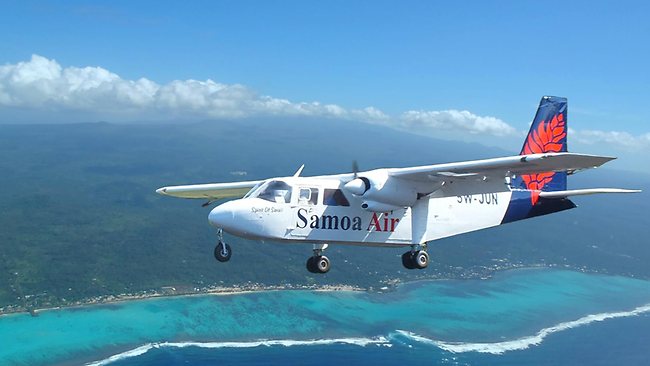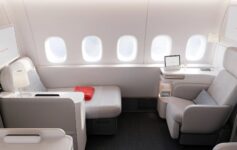Air Samoa made headlines this week with its new policy of charging passengers based upon their weight (personal + baggage). Many are wondering if such a policy could ever hit airlines in the United States. The answer is not likely.
Samoa Air, which opened in 2012, asks passengers to declare their personal weight during booking, which is then charged per kg (2.2 lb) at a rate dependent on flight length.
The customers will also be weighed at the check-in counter.
According to Samoa Air’s latest schedule, the airline charges up to WS $1.32 ($0.57) per kg for domestic flights and WS $2.40 ($1.03) per kg for its only international flight to American Samoa, around 402km (250 miles). A 150kg person flying one-way internationally would be charged $154.50.
Children under 12 are charged 75 percent of the adult rate, with fares also based on weight. Any overweight baggage is calculated at the same rate as the passenger’s personal weight.
Air Samoa has a microscopic operation compared to U.S. airlines and a simple way of calculating airfare–published pricing on a route with a set charge per kilo of weight. Compare that to the vast hub and spoke systems of the major U.S. airlines, where in many instances no two people have paid the same amount for their airfare on any particular flight. Fares fluctuate rapidly and the wide variety of fare classes within each class of service (economy, business, first) routinely leads to situations in which my seatmate paid three times the price I did for the same flight. We are not going back to the regulation era in this country, with published pricing based on route and no fluctuation in fares.
How then would the logistics work if legacy U.S. carriers charged by weight? A weight “surcharge” upon check-in for those over a pre-determined limit? Allowing 100lbs of “weight” (a combo of both human weight and baggage) and charging $25 for every additional 50lbs? Will elites be exempt? Airports lobbies are already so crowded and lines often long–this would slow down the process tremendously (just as airlines move away from people and push automated check-in kiosks) and not at all emulate the ordered system that Air Samoa has. Say goodbye to mobile check-in as well…
As a practical matter, hiring additional clerks to check weight would presumably be cheaper than the revenue that would be generated, but the lines would be a problem. Overweight passengers would be angry–livid in fact–particularly when science is not settled on how much control a person actually has over his weight. Many now view obesity as a disability and courts would be bogged down with litigation over the legality of discriminating on the basis of weight.
But I am not totally opposed to the idea. Obesity is an alarming epidemic in the States and though none of us should take any joy in shaming those who struggle with their weight, if this policy encourages people to adjust their lifestyle habits, it could be for the best. I think about the typical composition of a first class cabin and one word comes to mind–rotund. And that should not come as a shock to those road warriors who spend their lives on airplanes eating airplane food and hotel room service.
Furthermore, should a three year old kid who weights 40lbs really pay the same for her seat as New Jersey Governor Chris Christie? Does a 100lb woman with a 70lb piece of checked baggage really cost the airline more to transport than a 220lb man with no baggage? Or is charging per seat the only logical method of calculating fares?
Bottom line, theoretically and even from a fairness perspective I think weight-based pricing makes sense. Still, as practical matter I maintain this is untenable in the United States.
For an alternate perspective, see Ally Fogg’s thoughts in The Guardian.





Fine let the Airlines charge by weight, then charge you skinny people for oxygen use, charge for pressurizing the cabin, charge for oxygen masks, charge for the toilets, charge you every time a Flight Attendant has to help you.
You would argue that this is in the price of the ticket already, however Airlines in the spirit of making more profit would charge additional for these services once passengers are onboard.
Put that in your pipe and smoke it.
I’m working on getting my weight down for health reasons so I was interested in this article. A few things:
Weight gain may literally be an epidemic as in bacterial infection: http://www.dailymail.co.uk/health/article-2250450/Obesity-caused-gut-bacteria-eating.html This is why friends I know in other countries have a fatty diet and not much exercise but don’t seem to be gaining a lot of weight. But their cousins in the states are putting on the pounds. A similar thing happened with theories about ulcers which doctors swore were caused by stress and diet but turn out to be bacterial in nature (the doctor who bucked authority to prove this won the Nobel prize.)
I fit fine in a standard seat (if anything, a slightly more padded butt may be useful on these newer “slim” seats).
Weighing passengers can be done quite quickly. A digital scale at checkin people stand on and goes right into the system. Shouldn’t add a lot of time. But I don’t think this is the issue.
Other than island hoppers such as Samoa, the cost is in the seat for the most part. My friend who took her 3 year old daughter remarked that the girl weighed less than a checked bag but she had to buy a full ticket. Airlines will lose money if they essentially let families with small kids “fly free”. Airlines have major expenses in tracking and reporting passengers.
I think one solution to the fat person “flooding” into another seat issue is to make an economy plus seat that not only has greater legroom but width as well. They probably are slightly wider but for this case, they should go even further. Convert a few rows of 3 seats to 2 seats, for instance.
All that said, I think it would be a tremendous motivator for people to lose weight.
As a skinny person, for purely selfish reasons, I’d certainly love to see a pay-by-weight system. However, this strikes me as something that sounds decent in theory, but will prove to be too unwieldy to manage in real life for a large airline.
First, how do you pay for your ticket in advance? I don’t know of too many people who can accurately say down to the pound how much their baggage is going to way before the day of travel. And what happens if I gain 10 pounds (or lose 10) between the time I book the flight and the time I actually fly? I guess you’d have to pay an estimate at time of booking, and then go through a weigh-in process at the check-in counter to either pay the difference or be refunded – but this would require every passenger to go through a line at the airport, which will significantly raise check-in times as you note (and good luck getting your money back in any kind of a timely fashion).
Second, you’re going to have the inevitable arguments from passengers about how the scale at the airport is inaccurate. “You’re saying I weight 151 pounds, but I only weighed 146 on the scale at home an hour ago!!”. Ticket agents are harried enough without having to deal with that garbage multiple times a day.
Perhaps you could do some kind of tiered system, where say the first 200 pounds of total weight is included in your fare, then $25 extra for 201-250 pounds, then $75 for 251-350 pounds, etc. But then you’d still have to deal with some kind of weigh-in, either for all passengers or on a random basis, to ensure that people are playing by the rules.
That’s a long way of saying I don’t see a weight-based system as being feasible on a wide scale right now, regardless of the merits of the idea.
Even as a relatively slim guy I know that charging by weight is a bad play, at least the way Samoa Air is doing it. See, they aren’t just charging by weight; they’re charging by weight carried a certain distance. that means longer flights are more expensive per pound than shorter ones. And while that may more accurately represent the operating costs they incur it doesn’t mesh with the pricing systems favored by airlines in the rest of the world. It makes too much sense.
Airline pricing isn’t rational. It likely never will be.
The Samoa airlines plane in the photo is the kind of plane for which the pilot has to calculate the actual load (weight and balance) to make sure that the plane will operate properly. If he puts all the overweight people in the tail of the plane, and all the skinny ones in the front he may never be able to get the nose of the plane down. If he has the reverse situation where the heavy passengers sit in the front, he may never be able to get the nose up. Their system of weighing people helps them figure out how to operate the plane safely. In the process they charge the passengers for the amount of weight they bring on board regardless of whether it is the human or the suitcase. It’s like UPS and Fed-Ex. They charge by weight too, because it affects their bottom line. Makes total sense, except that humans have feelings and they get hurt when someone weighs them and makes them feel badly about themselves. BTW I weigh 220 pounds and am about 40 pounds overweight. I agree I should pay more than my 12 year old. I fit in a UA economy seat without crowding the person next to me. I have been crowded out of my seat by people who were over 300 pounds. They should have paid for part of my seat when their bodies squeezed into my seat and made me lean into the aisle for the entire flight. However, if they do charge big people more, they should also get bigger seats for their money.
Freight is weight.. weighing the freight n charging by the pound is how all freight rates are determined ? The airlines need to get in line